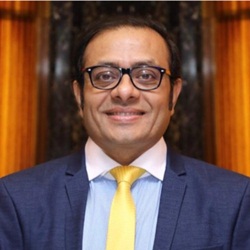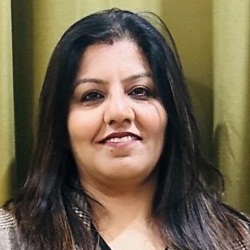
Tech leaders speak on how to create a more diverse and equitable workplace


The progress of women in India’s technology sector has been a noteworthy achievement but also a clear indication that more action is needed. According to the World Bank report, women make up nearly 43% of the total STEM graduates, but just 14% of scientists, engineers and technologists in research development institutions and universities. This inconsistency can be attributed to societal norms and biases that hinder women's progress in this field. In this context, TechCircle speaks to some of the women leaders who speaks on how companies can address the gender gap in technology, thereby creating a more diverse and equitable workplace.
 Vikas Gupta, Chief Technology Officer — Hiranandani Energy: “The glaring gender gap in technology stems from stereotypes, further deterring women in the workforce. Lack of school counselling worsens the situation. Initiatives need sponsorship and top-level backing. Goal-oriented efforts at all levels are essential, along with increased female representation. Starting gender orientation in K-12 and college is crucial. Business alone can't resolve this; governmental directives and societal shifts are imperative. By consciously integrating women into tech and fostering inclusivity, we ensure gradual representation. Decisive action is needed to address gender disparities in technology.
Vikas Gupta, Chief Technology Officer — Hiranandani Energy: “The glaring gender gap in technology stems from stereotypes, further deterring women in the workforce. Lack of school counselling worsens the situation. Initiatives need sponsorship and top-level backing. Goal-oriented efforts at all levels are essential, along with increased female representation. Starting gender orientation in K-12 and college is crucial. Business alone can't resolve this; governmental directives and societal shifts are imperative. By consciously integrating women into tech and fostering inclusivity, we ensure gradual representation. Decisive action is needed to address gender disparities in technology.

 Viloo Williams, Group Chief Information Officer — Grant Medical Foundation, Ruby Hall Clinic: “Mentorship is significant for women in technology, and we nurture it by providing skill development, confidence-building, and woman-to-woman sharing of experiences, leading to transformation that empowers our women to be the leaders of tomorrow. Women in hospitals have already made a mark in every clinical and administrative area, so mentoring them in technology, which was an exclusive male bastion, created unparalleled inclusivity! After years of being an all-male technology team, we now have women being an integral part of the team and being exposed to every technical challenge which we overcome successfully.”
Viloo Williams, Group Chief Information Officer — Grant Medical Foundation, Ruby Hall Clinic: “Mentorship is significant for women in technology, and we nurture it by providing skill development, confidence-building, and woman-to-woman sharing of experiences, leading to transformation that empowers our women to be the leaders of tomorrow. Women in hospitals have already made a mark in every clinical and administrative area, so mentoring them in technology, which was an exclusive male bastion, created unparalleled inclusivity! After years of being an all-male technology team, we now have women being an integral part of the team and being exposed to every technical challenge which we overcome successfully.”
 Pooja Chatrath, Chief Information Officer, Oncquest Labs: “Of the several ways to reduce gender gap, I believe that mentorship plays a crucial role in supporting women in fields where women are less represented at the top level, such as technology. Mentors identify areas for improvement, offer guidance, and enhance technical and soft skills. Their guidance expands professional networks, aiding in overcoming career obstacles and achieving success. Mentorship provides a space for women to seek advice and gain confidence through regular feedback, boosting self-assurance. Meeting successful women in tech demonstrates the possibility of thriving in this field, inspiring mentees to pursue and excel.”
Pooja Chatrath, Chief Information Officer, Oncquest Labs: “Of the several ways to reduce gender gap, I believe that mentorship plays a crucial role in supporting women in fields where women are less represented at the top level, such as technology. Mentors identify areas for improvement, offer guidance, and enhance technical and soft skills. Their guidance expands professional networks, aiding in overcoming career obstacles and achieving success. Mentorship provides a space for women to seek advice and gain confidence through regular feedback, boosting self-assurance. Meeting successful women in tech demonstrates the possibility of thriving in this field, inspiring mentees to pursue and excel.”

 Anjali Sharma, Director, Global Head of L&D, Fulcrum Digital: “When advocating for an increased representation of women in tech, continuous learning and development becomes essential. Investing in education, mentorship, and leadership initiatives empowers women to break barriers. The journey towards gender equality in technology is a shared responsibility, with collaboration needed from individuals, organizations, and policymakers. Let's move forward inspired by progress, committed to transformative education and mentorship, to shape a more inclusive and innovative future in technology.”
Anjali Sharma, Director, Global Head of L&D, Fulcrum Digital: “When advocating for an increased representation of women in tech, continuous learning and development becomes essential. Investing in education, mentorship, and leadership initiatives empowers women to break barriers. The journey towards gender equality in technology is a shared responsibility, with collaboration needed from individuals, organizations, and policymakers. Let's move forward inspired by progress, committed to transformative education and mentorship, to shape a more inclusive and innovative future in technology.”

 Poonam Puthran, Executive Vice President — Banking at Aurionpro: “Currently, women are leading the way in technology, shattering boundaries, and guiding with foresight. Advocating for inclusiveness, celebrating differences, and cultivating an environment where all perspectives are respected are crucial. Within the ever-evolving tech industry, women are instrumental in moulding the future. Through their guidance and perseverance, we navigate a path towards success, propelling our company with conviction and resolve.
Poonam Puthran, Executive Vice President — Banking at Aurionpro: “Currently, women are leading the way in technology, shattering boundaries, and guiding with foresight. Advocating for inclusiveness, celebrating differences, and cultivating an environment where all perspectives are respected are crucial. Within the ever-evolving tech industry, women are instrumental in moulding the future. Through their guidance and perseverance, we navigate a path towards success, propelling our company with conviction and resolve.
 Geetha Ramanna, Director, Software Development and Network Security, Sophos: "Within the cybersecurity industry, there is a strong need to invest in and embrace the potential of women to transform the sector. In my experience, working in an environment where mentorship is encouraged, and robust support systems thrive, can be a game-changer and opens up several doors for our growth. Cybersecurity is a highly dynamic space, with its fair share of complexities. Being able to efficiently work in such an environment requires innovative thinking, adaptability and empathy- the qualities that women excel in. An increase in representation in the sector is not only about diversity, it's about ensuring a more resilient and inclusive digital world. As we move ahead, we look forward to a world with increased inclusivity and seeing more women techies thrive in the cybersecurity space.”
Geetha Ramanna, Director, Software Development and Network Security, Sophos: "Within the cybersecurity industry, there is a strong need to invest in and embrace the potential of women to transform the sector. In my experience, working in an environment where mentorship is encouraged, and robust support systems thrive, can be a game-changer and opens up several doors for our growth. Cybersecurity is a highly dynamic space, with its fair share of complexities. Being able to efficiently work in such an environment requires innovative thinking, adaptability and empathy- the qualities that women excel in. An increase in representation in the sector is not only about diversity, it's about ensuring a more resilient and inclusive digital world. As we move ahead, we look forward to a world with increased inclusivity and seeing more women techies thrive in the cybersecurity space.”

 Jagriti Kumar, Chief Financial Officer, NLB Services: “While STEM education holds immense promise for girls, the reality reflects a stark gender gap, with women accounting for only 29.2% of all STEM workers. Addressing this gap necessitates multifaceted approaches, including mentorship initiatives connecting aspiring female students with seasoned STEM professionals, offering guidance and insights. Moreover, fostering a workplace culture that embraces diversity and inclusivity is paramount for attracting and retaining female talent in STEM domains. In the domain of finance, the picture is similar, if not more pronounced, with women representing a mere 21% in payroll roles and less than 16% in key management positions. In essence, bridging the gender gap across technology, STEM, and finance isn't just a matter of equity- it's a strategic imperative for driving innovation, fostering economic growth, and building a more inclusive society.”
Jagriti Kumar, Chief Financial Officer, NLB Services: “While STEM education holds immense promise for girls, the reality reflects a stark gender gap, with women accounting for only 29.2% of all STEM workers. Addressing this gap necessitates multifaceted approaches, including mentorship initiatives connecting aspiring female students with seasoned STEM professionals, offering guidance and insights. Moreover, fostering a workplace culture that embraces diversity and inclusivity is paramount for attracting and retaining female talent in STEM domains. In the domain of finance, the picture is similar, if not more pronounced, with women representing a mere 21% in payroll roles and less than 16% in key management positions. In essence, bridging the gender gap across technology, STEM, and finance isn't just a matter of equity- it's a strategic imperative for driving innovation, fostering economic growth, and building a more inclusive society.”
.jpg) Ashish Saraf, VP and Country Director, Thales — India: “At Thales, we take great pride in honouring the achievements of our women globally. Our women engineers based at our engineering centers in India are instrumental in driving innovation within Thales, serving as a source of inspiration for the entire organisation. We believe that a diverse team can support higher performance in the workplace, and we remain committed to providing equal opportunities to women in an inclusive, safe, and respectful work environment.”
Ashish Saraf, VP and Country Director, Thales — India: “At Thales, we take great pride in honouring the achievements of our women globally. Our women engineers based at our engineering centers in India are instrumental in driving innovation within Thales, serving as a source of inspiration for the entire organisation. We believe that a diverse team can support higher performance in the workplace, and we remain committed to providing equal opportunities to women in an inclusive, safe, and respectful work environment.”

